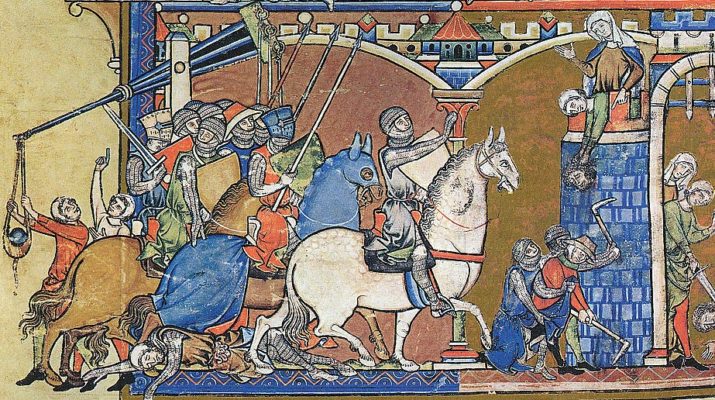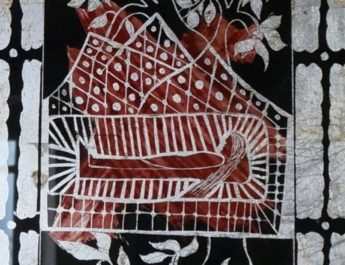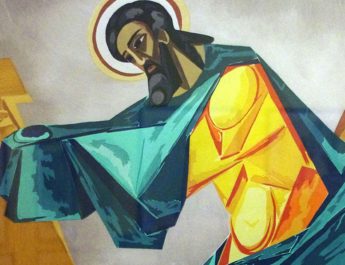2 Samuel 20:1-3, 14-22
A Women’s Lectionary 46
I {untranslated} = ish. Perhaps from enosh (human, humankind, mortal); from anash (to be weak, sick, or frail). This is man, husband, another, or humankind.
II “scoundrel” = beliyyaal. From beli (lack, nothing, without, wearing out, failure, destruction); {from balah (to grow old, wear out, waste away, consume, spend)} + yaal (to gain, profit, do good, ascend, be useful or valuable; benefitted). This is lacking profit i.e. worthlessness, destruction, evil, ungodly person, wickedness, or Belial.
III “named” = shem. May be from sum (to put, place, set). This is name, fame, renown. A name was thought to indicate something essential about a person – something about their individuality. So, this word can also mean honor, authority, or character.
ShebaIV sonV of Bichri,VI a Benjaminite,VII
IV “Sheba” = Sheba. 10x in OT. From the same as sheba (seven – the number of perfection/sacred fullness); perhaps from shaba (to swear, curse, vow, make a covenant; properly, to be complete; this is to seven oneself – as in affirming something so strongly it is as though it were said seven times). This is Sheba a place and personal name meaning “seven” or “oath.” See https://www.abarim-publications.com/Meaning/Sheba.html
V “son” = ben. From banah (to build or obtain children). This is son, age, child. It is son in a literal or figurative sense.
VI “Bichri” = Bikri. 8x in OT – all in this passage. From bakar (to bear fruit, be firstborn, firstling, that which opens the womb, give the birthright to). This is Bichri or Bikri, a name meaning “youthful” or “my first born” or “juvenile” or “pertaining to initial fruition.” See https://www.abarim-publications.com/Meaning/Bichri.html
VII “Benjaminite” = ish + Yamini. Ish is the same as {untranslated} in v1. See note I above. Yamini is 2x in OT. From Yamin (Jamin or Yamin, a personal name meaning “right hand”); from the same as yamin (right hand or side; that which is stronger or more agile; the south); may be from yamam (to go or choose the right, use the right hand; to be physically fit or firm). This is Jaminite, Jeminith, or Benjaminite.
happened to beVIII there. He soundedIX the trumpetX and cried out,
VIII “happened to be” = qara. This is to meet, befall, happen upon. It can be to encounter by chance or for aggression.
IX “sounded” = taqa. This is to clap, clatter, thrust, sound an instrument, hammer a nail, be a bondsman.
X “trumpet” = shophar. From shaphar (being beautiful or lovely). This is a ram’s horn, trumpet, or cornet. A shofar is still blown at Jewish festivals such as Rosh Hashanah (the Jewish new year celebration).
“We have no portionXI in David,XII
no shareXIII in the son of Jesse!XIV
XI “portion” = cheleq. From chalaq (to be smooth in a figurative sense; can refer to the stones that were part of casting lots – hence, apportion, share, distribute; figuratively, it can also mean to flatter). This is a division, lot, inheritance, legacy, or portion. It can also refer to a smooth tongue.
XII “David” = David. From the same as dod (beloved, love, uncle); the root may mean to boil, which is used figuratively to describe love. So, this implies someone you love such as a friend, a lover, or a close family member like an uncle. David’s name likely means something like “beloved one.”
XIII “share” = nachalah. Related to nachal (to inherit, occupy, distribute, take as heritage). This is properly something that was inherited. It can mean occupancy generally or, more particularly, an heirloom or an estate. This can be an inheritance, gift, possession, or portion.
XIV “Jesse” = Yishay. Perhaps from ish (man); {perhaps from enosh (human, humankind, mortal); from anash (to be weak, sick, or frail)} OR from the same as yesh (being, existence, substance). This is Jesse, a name which means “my husband” or “the Lord exists.” See https://www.abarim-publications.com/Meaning/Jesse.html
EveryoneXV to your tents,XVI O Israel!”XVII
XV “everyone” = ish. Same as {untranslated} in v1. See note I above.
XVI “tents” = ohel. Perhaps from ahal (to shine, be clear). This is a tent, covering, home, or side pillar.
XVII “Israel” = Yisrael. From sarah (to persist, exert oneself, contend, persevere, wrestle, prevail) + el (God or god). This is Israel, meaning God strives or one who strives with God; new name for Jacob and for his offspring. This refers to the people and to the land.
2 So allXVIII the peopleXIX of Israel withdrewXX fromXXI David and followedXXII Sheba son of Bichri, but the people of JudahXXIII followed their kingXXIV
XVIII “all” = kol. From kalal (to complete). This is all or every.
XIX “people” = ish. Same as {untranslated} in v1. See note I above.
XX “withdrew” = alah. This is to go up, approach, ascend, be high, be a priority; to arise in a literal or figurative sense.
XXI “from” = achar. From achar (to remain behind, linger, continue, be behind, or delay; can also imply procrastination). This is after or the last part, following.
XXII “followed” = achar. Same as “from” in v2. See note XXI above.
XXIII “Judah” = Yehudah. Probably from yadah (to throw one’s hands into the air in a gesture of praise); from yad (hand). This is Judah, meaning “praised.”
XXIV “king” = melek. From malak (to be or become king or queen, to rise to the throne, to be crowned; by implication, to take counsel). This is king or royal.
steadfastlyXXV from the JordanXXVI to Jerusalem.XXVII
XXV “followed…steadfastly” = dabaq. This is to follow closely or abide fast, to cling or be joined together. Figuratively, it can mean to catch something by chasing after it, to overtake, or to stick. A man clings to his wife in Genesis 2:24, Shechem was deeply attracted to Dinah in Genesis 34:3, Ruth clung to Naomi in Ruth 1:14, Solomon clung to his foreign wives and concubines in 1 Kings 11:2. It is also used of a tongue sticking to the mouth, pursuing or overtaking as in battle, and also clinging to God.
XXVI “Jordan” = Yarden. From yarad (to go down, descend; going down in a literal or figurative sense; going to the shore or a boundary, bringing down an enemy). This is the Jordan River, meaning “descending.”
XXVII “Jerusalem” = Yerushalaim. From yarah (to throw, shoot, be stunned; to flow as water so figuratively to instruct or teach) + shalam (to make amends, to be complete or sound). This is Jerusalem, dwelling of peace.
3 David cameXXVIII to his houseXXIX at Jerusalem, and the king tookXXX the tenXXXI, XXXII concubines
XXVIII “came” = bo. This is to enter, come in, advance, fulfill, bring offerings, enter to worship, attack. It can also have a sexual connotation.
XXIX “house” = bayit. Related to “son” in v1. Probably from banah (see note V above). This is house, court, family, palace, temple.
XXX “took” = laqach. This is to take, accept, carry away, receive. It can also have the sense of take a wife or take in marriage.
XXXI “ten” = eser. Perhaps from asar (to tithe, render a tenth of). This is ten or -teen. While 7 is symbolically the number of perfection, ten is also symbolically a number of perfection (but to a lesser degree than 7 is).
XXXII {untranslated} = ishshah. Related to {untranslated} in v1. From ish (see note I above). This is woman, wife, or female.
whom he had leftXXXIII to look afterXXXIV the house and putXXXV them in a house under guardXXXVI and provided forXXXVII them but did not go inXXXVIII to them.
XXXIII “left” = yanach. Perhaps from the same as nuach (to rest, calm, camp, free, place, remain, satisfy, settle, station, or wait; implies settling down in a literal or figurative sense). This is to lay down, let alone, pacify, cast down, or deposit. It can also mean to allow something or someone to stay.
XXXIV “look after” = shamar. This is to keep, watch, or preserve. It means to guard something or to protect it as a thorny hedge protects something.
XXXV “put” = natan. This is to give, put, set, offer. It is to give literally or figuratively.
XXXVI “under guard” = mishmereth. Related to “look after” in v3. From mishmar (jail, guard, watch, guard post); from shamar (see note XXXIV above). This is a guard or watch or guard post. It is used figuratively for obligation, duty, or observance, including religious observance.
XXXVII “provided for” = kul. This is to hold in. So, it can be to contain, measure, guide, or feed. It can also mean to be able to or sustain.
XXXVIII “go in” = bo. Same as “came” in v3. See note XXVIII above.
So they wereXXXIX shut upXL until the dayXLI of their death,XLII livingXLIII as if in widowhood.XLIV
XXXIX “were” = hayah. This is to be or become, to happen.
XL “shut up” = tsarar. This is to bind, restrict, narrow, be cramped, an adversary.
XLI “day” = yom. Root may mean being hot. This is the day in a literal or figurative sense. It can also mean birth, age, daylight, continually or other references to time.
XLII “death” = mut. This is to die in a literal or figurative sense. It can also refer to being a dead body.
XLIII “living” = chayyuth. 1x in OT. From chayah (to live or keep alive literally or figuratively). This is life or living.
XLIV “widowhood” = alamanuth. 4x in OT. From alman (widowed); from alam (to be silent, bound). This is widow or widowhood as a concept.
14 Sheba passedXLV through all the tribesXLVI of Israel to AbelXLVII of Beth-maacah,XLVIII
XLV “passed” = abar. This is to pass over or cross over. It is used for transitions, whether literal or figurative. It can also mean to escape, alienate, or fail. This is the root verb from which “Hebrew” is drawn.
XLVI “tribes” = shebet. This is a rod, staff, club, scepter, dart, or tribe. Literally a stick that can be used for punishing, writing, fighting, walking, ruling; thus, used figuratively for a clan.
XLVII “Abel” = Abel. 4x in OT. From the same as abel (meaning meadow or plain; perhaps from a word that means being grassy). This is Abel, a place name meaning “meadow.”
XLVIII “Beth-maacah” = Beth Maakah. Related to “son” in v1 & “house” in v3. 2x in OT – both in this passage. From bayit (see note XXIX above) + Maakah (Maacah or Maakath, meaning “depression” or “oppression” or “squeezer”); {from maak (to pierce, squeeze, stick, handle)}. This is Beth-maacah or Beth Maakah, meaning “house of Maakah.” See https://www.abarim-publications.com/Meaning/Maacah.html
and all the BichritesXLIX assembledL and followed him inside.LI 15 Joab’s forces came and besiegedLII him in Abel of Beth-maacah; they threw upLIII a siege rampLIV
XLIX “Bichrites” = Beri. 1x in OT. This is Beri, Berites, or Bichrites.
L “assembled” = qalah. 1x in OT. From the same as qahal (to gather, convene, assemble like a congregation). This is to gather together or assemble.
LI “followed…inside” = bo…achar. Bo is the same as “came” in v3. See note XXVIII above. Achar is the same as “from” in v2. See note XXI above.
LII “besieged” = tsur. This is to confine, assault, bind up, be an adversary.
LIII “threw up” = shaphak. This is to pour out, gust, or slip. It can be to pour as blood, a drink offering, or molten metal. It can also mean to create a mound. Figuratively, it can refer to killing, or spending money.
LIV “siege ramp” = solelah. 11x in OT. From salal ((to lift up, build, pile, exalt, mount up; can also be used for opposing as a dam holds back water). This is a siege ramp, siege-work, rampart, or other mound used for military purposes.
against the city,LV and it stoodLVI against the rampart.LVII Joab’sLVIII, LIX
LV “city” = iyr. From uwr (to awaken or wake oneself up). This can mean excitement in the sense of wakefulness or city. Properly, this is a place that is guarded. Guards kept schedules according to watches. This sense of the word would include cities as well as encampments or posts that were guarded.
LVI “stood” = amad. This is to stand up in a literal or figurative sense. So it can be establish, continue, endure, take a stand, act, be a servant, stand still, remain, stand against an enemy.
LVII “rampart” = chel. From chul (whirling around so dancing as in a circle or writhing in pain; used particularly for the pain of childbirth or from writhing due to fear; can also be falling in pain or waiting) OR from chayil (strength, wealth, ability, activity; a soldier or a company of soldiers; goods; a force of people, means, or goods; valor, virtue, or strength); from chul (to be firm, strong, prosperous; to endure). This is an army, entrenchment, fortress, wall, or host.
LVIII {untranslated} = kol. Same as “all” in v2. See note XVIII above.
LIX “Joab’s” = Yoab. Related to “were” in v3. From YHVH (proper name of the God of Israel; God, Lord; the self-existent or eternal one); {from havah (to become) or hayah (see note XXXVIII above)}. + ab (father, ancestor, grandfather; father in a literal or figurative sense). This is Joab or Yoab, meaning “the Lord is father.”
forcesLX were batteringLXI the wallLXII to break it down.LXIII
LX “forces” = am. From amam (to darken, hide, associate; creating shadows by huddling together). This is people or nation. It can be used specifically for a tribe, collectively of troops or armies, or figuratively to refer to a flock of animals.
LXI “battering” = shachath. This is to go to ruin, perish, decay, batter, cast off, lose, one who destroys. This can be used in a literal or figurative sense.
LXII “wall” = chomah. From the same as cham (father-in-law – one’s husband’s father; perhaps from a root meaning to join). This is a wall – a wall as used for protection.
LXIII “break…down” = naphal. This is to fall, whether by accident, to fall prostrate, or to fall in violent death. Figuratively, it can refer to personal ruin or calamity, a city falling, an attack or a falling away. It can also be a deep sleep or wasting away.
16 Then a wiseLXIV womanLXV calledLXVI from the city, “Listen!LXVII Listen! TellLXVIII Joab,
LXIV “wise” = chakam. From chakam (to be wise or teach wisdom; this is wisdom in thought, word, or action). This is wise, skillful, cunning, or artful.
LXV “woman” = ishshah. Same as {untranslated} in v3. See note XXXII above.
LXVI “called” = qara. This is to call or call out – to call someone by name. Also used more broadly for calling forth.
LXVII “listen” = shama. This is to hear, call, consent, or consider. It implies listening intelligently, giving attention, and, because of these two factors, obedience and action are often implied.
LXVIII {untranslated} = na. This particle is used for requests or for urging. It can be we pray, now, I ask you, oh. This is the same “na” in “hosanna.”
‘ComeLXIX here,LXX I want to speakLXXI to you.’”
17 He came nearLXXII her, and the woman said, “Are you Joab?”
He answered, “I am.”
Then she said to him, “Listen to the wordsLXXIII of your servant.”LXXIV
He answered, “I am listening.”
LXIX “come” = qarab. This is to come near, offer, make ready, approach, take.
LXX “here” = hennah. Perhaps from hen (lo! Behold! If, though; an expression of surprise). This is here in a location or here in a time, i.e. now.
LXXI “speak” = dabar. This is generally to speak, answer, declare, or command. It might mean to arrange and so to speak in a figurative sense as arranging words.
LXXII “came near” = qarab. Same as “come” in v16. See note LXVIII above.
LXXIII “words” = dabar. Related to “speak” in v16. From dabar (see note LXX above). This is speech, a word, a matter, an affair, charge, command, message, promise, purpose, report, request. It is a word, which implies things that are spoken of in a wide sense.
LXXIV “servant” = amah. This is female servant or slave, handmaid.
18 Then she said, “They used to sayLXXV in the oldLXXVI days, ‘Let them inquireLXXVII at Abel,’ and soLXXVIII they would settleLXXIX a matter.
LXXV “used to say” = dabar + dabar. Same as “speak” in v16. See note LXX above. The word is repeated twice – the first time as an Infinitive Absolute. The Infinitive Absolute serves to emphasize the sentiment of the word. It is rather like Foghorn Leghorn’s speech pattern, “I said, I said.”
LXXVI “old” = rishon. From rishah (beginning or early time); from rosh (head, captain, or chief; excellent or the forefront; first in position or in statue or in time). This is first, former, ancestor, beginning, ranked first.
LXXVII “inquire” = shaal + shaal. This is to ask, inquire, beg, borrow, desire, request. It can also mean to demand. The word is repeated twice – the first time as an Infinitive Absolute. The Infinitive Absolute serves to emphasize the sentiment of the word. It is rather like Foghorn Leghorn’s speech pattern, “I said, I said.”
LXXVIII “so” = ken. Perhaps from kun (properly, in a perpendicular position; literally, to establish, fix, fasten, prepare; figuratively, it is certainty, to be firm, faithfulness, render sure or prosperous). This is to set upright. Generally used figuratively to mean thus, so, afterwards, rightly so.
LXXIX “settle” = tamam. This is to finish or accomplish. It is to make perfect, demonstrate that you are upright, consume or cease. It is to complete in a literal or figurative sense, positive or negative.
19 I am one of those who are peaceableLXXX and faithfulLXXXI in Israel; you seekLXXXII
LXXX “am…peaceable” = shalam. This is to be complete or sound – to have safety mentally, physically, or extending to one’s estate. So, if these things are safe and complete, the implication is that one would be friendly; and, if being friendly, one would make amends and that friendship would be reciprocated. This is the root verb that “shalom” comes from, the Hebrew word for peace.
LXXXI “faithful” = aman. This is to believe, endure, fulfill, confirm, support, be faithful. It is to put one’s trust in, be steadfast. Figuratively, this is to be firm, steadfast, or faithful, trusting, believing, being permanent, morally solid. This is where the word “amen” comes from.
LXXXII “seek” = baqash. This is to seek, ask, desire, or request. It can be any kind of searching. It can also mean to worship or pray – implies a striving for.
to destroyLXXXIII a city that is a motherLXXXIV in Israel; why will you swallow upLXXXV the heritageLXXXVI of the Lord?”LXXXVII
LXXXIII “destroy” = mut. Same as “death” in v3. See note XLI above.
LXXXIV “mother” = em. This is a mother as binding a family together or a breeding female animal. It could be mother in a literal or figurative sense.
LXXXV “swallow up” = bala. This is to swallow, engulf, cover, or destroy.
LXXXVI “heritage” = nachalah. Same as “share” in v1. See note XIII above.
LXXXVII “Lord” = YHVH. Related to “were” in v3 & “Joab’s” in v15. See note LVIII above.
20 Joab answered,LXXXVIII “Far be itLXXXIX from me, far be it, that I should swallow up or destroy!XC 21 ThatXCI is not the case!XCII But a manXCIII of the hill countryXCIV
LXXXVIII “answered” = anah. This is answer, respond, announce, sing, shout, or testify. It means to pay attention, which implies responding and, by extension, starting to talk. Used in a specific sense for singing, shouting, testifying, etc.
LXXXIX “far be it” = chalilah. From chalal (to defile, pollute). This is literally something that is profaned. It is used to mean “God forbid” or “far be it.”
XC “destroy” = shachath. Same as “battering” in v15. See note LX above.
XCI “that” = dabar. Same as “words” in v17. See note LXXII above.
XCII “case” = ken. Same as “so” in v18. See note LXXVII above.
XCIII “man” = ish. Same as {untranslated} in v1. See note I above.
XCIV “hill country” = har. From harar (hill or mountain). This is mountain, hill, hilly region.
of EphraimXCV calledXCVI Sheba son of Bichri has liftedXCVII up his handXCVIII against King David;
XCV “Ephraim” = Ephrayim. From the same as epher (ashes or dust – properly something strewn) OR from parah (to grow, increase, be fruitful in a literal or figurative sense). This is Ephraim, one of Joseph’s sons, his descendants, and their land.
XCVI “called” = shem. Literally, “by name.” Same as “named” in v1. See note III above.
XCVII “lifted” = nasa. This is to lift in a broad sense, literally and figuratively. So it could be to carry, take, or arise. It could also be bring forth, advance, accept.
XCVIII “hand” = yad. This is hand, ability, power. Hand in a literal sense, but also what one can do or the means by which one does it.
give him upXCIX alone,C and I will withdrawCI from the city.”
The woman said to Joab, “CIIHis headCIII shall be thrownCIV over the wall to you.”
XCIX “give…up” = natan. Same as “put” in v3. See note XXXV above.
C “alone” = bad. From badad (to divide or be separated; alone, solitary, lonely, isolated, straggler). This is apart, alone, separation, body part, tree branch, except. It can also be a city’s chief.
CI “withdraw” = halak. This is go, come, walk. It is walk literally and figuratively and includes people and animals. It can be used figuratively for one’s moral life – how we walk according to God’s way or against it. It can also refer to the walk of life as in the course one’s life takes, the choices we make, etc.
CII {untranslated} = hinneh. Related to “here” in v16. From hen (see note LXX above). This is to draw attention, show suddenness or surprise, or to emphasize the importance of the coming statement. See! Lo! Behold!
CIII “head” = rosh. Related to “old” in v18. See note LXXVI above.
CIV “thrown” = shalak. This is to throw, fling, or hurl. It can also be to throw away in a literal or figurative sense.
22 Then the woman wentCV to all the peopleCVI with her wiseCVII plan. And they cut offCVIII the head of Sheba son of Bichri and threw it out to Joab.
CV “went” = bo. Same as “came” in v3. See note XXVIII above.
CVI “people” = am. Same as “forces” in v15. See note LX above.
CVII “wise” = chokmah. Related to “wise” in v16. From chakam (see note LXIV above). This is wisdom, wit, or skillfulness.
CVIII “cut off” = karat. This is to cut down, cut off, or make a covenant (idiom for making a covenant is “to cut a covenant”). It can also mean to destroy, fail, or consume.
So he blewCIX the trumpet, and they dispersedCX from the city, and allCXI went to their homes,CXII while Joab returnedCXIII to Jerusalem to the king.
CIX “blew” = taqa. Same as “sounded” in v1. See note IX above.
CX “dispersed” = puts. This is to dash in pieces, scatter, disperse, drive.
CXI “all” = ish. Same as {untranslated} in v1. See note I above.
CXII “homes” = ohel. Same as “tents” in v1. See note XVI above.
CXIII “returned” = shub. To turn back, return, turn away – literally or figuratively. Doesn’t necessarily imply going back to where you started from. This is also the root verb for the Hebrew word for repentance “teshubah.”
Image credit: “Joab pursues Sheba to the city of Abel” – Anonymous from the Morgan Bible, around the 1240’s or 1250’s.




